Pound plunges after Bank of England's dovish rates signal
Central bank revises its growth forecast for UK economy
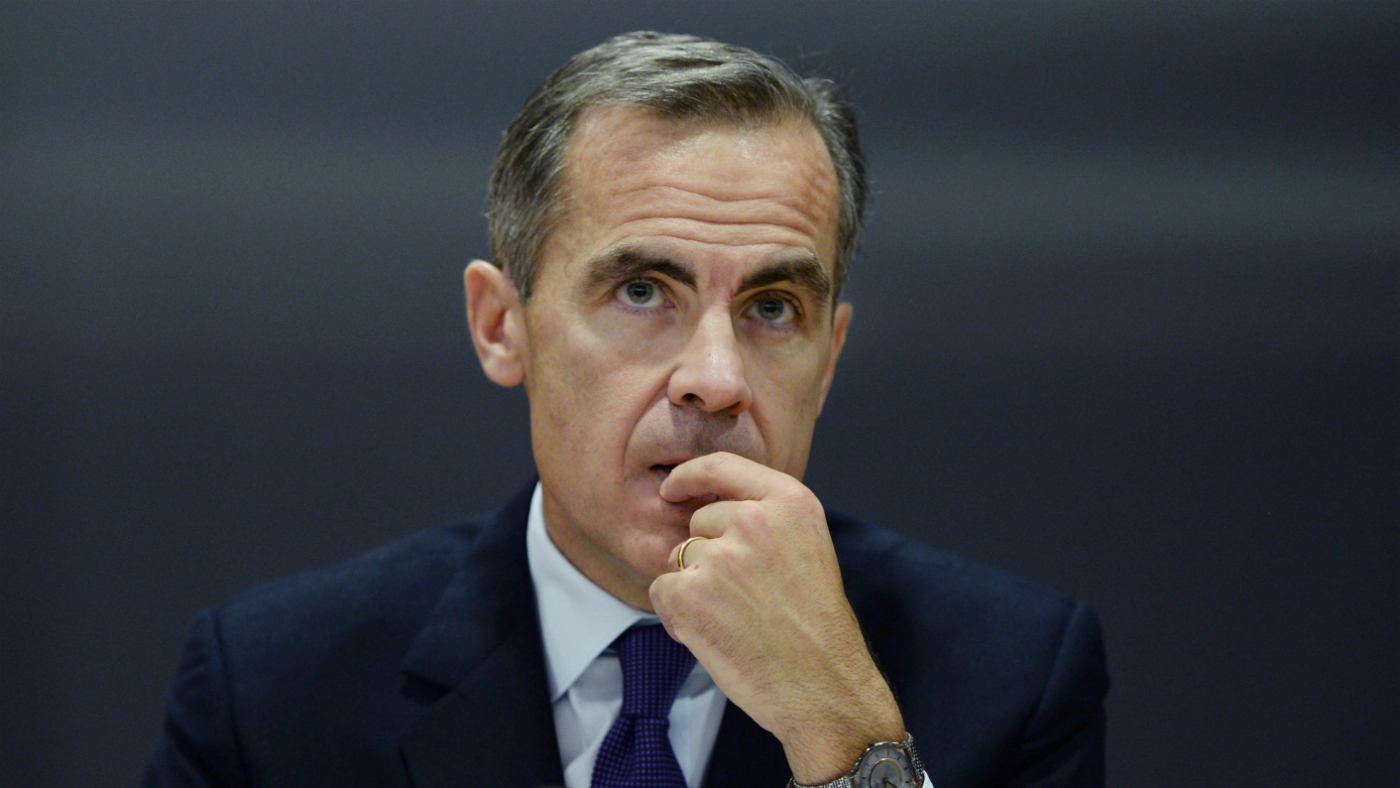
A free daily email with the biggest news stories of the day – and the best features from TheWeek.com
You are now subscribed
Your newsletter sign-up was successful
Interest rates: should you be worried about an increase?
20 July
Bank of England governor Mark Carney has given his strongest indication yet that we could see the base interest rate rise in the UK, perhaps even before the end of the year. But would a move to shift rates from a record low be wise, or could it threaten a fragile recovery?
BBC economics editor Robert Peston wrote on his blog last week that Carney's remarks in a speech on Thursday followed the publication of data showing further acceleration in wages but a surprise rise in hitherto plunging unemployment figures.
The Week
Escape your echo chamber. Get the facts behind the news, plus analysis from multiple perspectives.

Sign up for The Week's Free Newsletters
From our morning news briefing to a weekly Good News Newsletter, get the best of The Week delivered directly to your inbox.
From our morning news briefing to a weekly Good News Newsletter, get the best of The Week delivered directly to your inbox.
Many have argued that the increase in the jobless count would persuade the bank to hold fire on rates. However, in as much as the latest statistics could be a reflection that a skills shortage is both holding back employment and driving pay up, Peston said a rate rise could be seen as a "shrewd" way to "prevent wage inflation forcing a significant pick-up in price inflation."
The Times's economics columnist Philip Aldrick is strongly in favour of a rise, saying that the persistence of ultra-low rates – in the UK the 0.5 per cent low has been unchanged for more than six years – has pushed banks and others to load up on "junk" debt and pump money "recklessly into emerging markets in a desperate search for returns."
He also challenges the view that UK household debt levels should prompt caution on rates, arguing that "rock-bottom rates… encourage more borrowing and higher borrowing reinforces the need for low rates." A similar argument was made recently by the Bank for International Settlements, a global central bank.
In The Guardian, Heather Stewart argues against an imminent rise and cites UK debt levels, which are comparatively high by international standards, adding that a majority of mortgage holders are on floating rates. This implies a significant negative effect on spending capacity if rates were increased. This, in combination with a corollary jump in the value of the pound that would hit exports, could threaten the recovery, she says.
A free daily email with the biggest news stories of the day – and the best features from TheWeek.com
The real consequences of a rate rise likely to be 0.25 per cent initially are said by The BBC to be limited. The corporation argues that while 56 per cent of mortgagers are on a variable rate, standard variable rates applied by banks did not fall in line with the base rate and so are unlikely to do so on the way up until there has been a substantial movement. There would also be benefits for those with substantial savings who have been stuck with poor rates for years.
In the Daily Mail, Peter Spencer, chief economic adviser to the Ernst and Young Item Club, is quoted as saying the debate may not in fact be relevant. He told the paper that Mark Carney's remarks had been "dramatically misinterpreted" and that the governor had only indicated the Bank of England would begin looking at rates at the turn of the year.
Spencer said an actual rise was unlikely before February at the earliest and would probably come even later.
Interest rates to rise 'at turn of year', hints Carney
17 July
Mark Carney has signalled that UK interest rates could rise "at the turn of this year".
In a speech at Lincoln Cathedral, the Bank of England governor said that he expected rates to rise over the next three years, reaching "about half as high as historical averages", or about 2 per cent.
Explaining that the Monetary Policy Committee "will have to feel its way as it goes", he added: "In my view, the decision as to when to start such a process of adjustment will likely come into sharper relief around the turn of this year."
However, the Canadian also indicated that shocks to the economy could change the timing and the size of any rate rise, the BBC reports.
It was the second time this week he has alluded to an impending rates rise. On Tuesday, he told the Treasury Select Committee that the UK is "moving closer" to a rise in interest rates after more than six years at the historical low of 0.5 per cent, as the UK economy recovers from the financial crash.
Howard Archer, chief UK and European economist at IHS Global Insight, told Sky News that the rise could come as soon as November. He said Carney had reinforced comments from the Bank of England "seemingly preparing consumers and businesses for an interest rate hike".
Archer said there was now a "very real possibility" the MPC could increase the base rate of interest from 0.5 per cent to 0.75 per cent before the end of the year and "most likely in November".
[[{"type":"media","view_mode":"content_original","fid":"83250","attributes":{"class":"media-image"}}]]
UK interest rates: fresh risk warning, but caution set to prevail
17 July
Ultra-low interest rates around the developed world have failed to address significant structural issues within economies thereby leaving policymakers with little recourse in the event of another major financial shock, according to the annual report of the influential Bank for International Settlements.
The BIS, which is often referred to as the central bank of global central banks, warns that what used to be considered "unthinkable" risks becoming the "new normal", according to The Guardian. It highlights that rates have been held at record lows for a number of years – in the UK rates have been at a 0.5 per cent nadir since 2009.
The Daily Telegraph notes that the report references the cyclical nature of policy response to unusually weak recovery from the 2008 financial crisis, with low interest rates fuelling asset booms which have turned to busts and prompted policymakers to respond with even lower rates. "The result is too much debt, too little growth and too low interest rates," it says.
The warning follows a report from the OECD that low risks pose a threat to pension funds and insurers with long-term commitments.
Despite the ongoing arguments over rates, in the UK there appears little hope of a rate rise in the near future. According to the Telegraph at the weekend, economists are predicting a rate rise around March next year and markets are pricing in a rise later, sometime around May or June.
Elsewhere the American central bank could be set to increase its rate from a record low of 0.25 per cent, as data continues to point to a strengthening of its recovery. In an interview with the Financial Times William Dudley, president of the Reserve Bank of New York, said a rate hike will be "very much in play" at the Federal Reserve's September meeting.
Rock bottom interest rates pose threat for pension funds
25 June
A low-interest rate environment across the globe could force pension funds and insurers into riskier investments in order to meet long-term commitments to their policyholders, according to the Paris-based multinational forum the Organisation for Economic Cooperation and Development (OECD).
In a report published yesterday the group, whose interventions on economic matters are considered influential, cited concerns that rock bottom rates across the world are reducing the returns on the safer, fixed income assets such as government and corporate bonds on which such firms rely and that typically make up around 40 per cent of pension portfolios.
A further concern in the report, The Independent notes, is that weak returns could ultimately force funds and insurers to take on greater risks by shifting their investment base towards higher risk investments such as private equity, derivatives and structured products.
Rates are low in most major Western economies as loose monetary policy has been maintained to avoid stifling a nascent recovery. In the UK the base interest rate has remained at a record low 0.5 per cent since March 2009, while in the US the rate is currently 0.25 per cent and across the Eurozone it is 0.75 per cent. In the UK, despite comments from noted hawk Martin Weale, there is unlikely to be any movement before the autumn at the earliest, while the Wall Street Journal reported earlier this week that the US central bank may move to increase rates in September.
The OECD report also expresses concerns over a trend for major listed insurers to return cash to shareholders, for example through dividends, in order to boost short-term returns, which it says "means that capital will not be reinvested in more productive activities".
Interest rates: Bank hawk hints at summer split
24 June
An external member of the Bank of England committee responsible for setting the UK interest rate has hinted that he may vote for an increase as early as August.
In an interview with the Financial Times, Martin Weale, a noted hawk on the Monetary Policy Committee, cited diminished concerns over wage growth and said the "the labour market … is fizzing away nicely". Unemployment stood at 5.5 per cent last month, well below Bank of England governor Mark Carney's original threshold for a rate review in 2014 of 7 per cent, as wage growth jumped to a four-year high of 2.7 per cent.
He also noted the recovery in the oil price, a steep fall in which has held inflation close to zero and even helped push the UK into deflation in May. Weale said he would not vote to increase rates in July as this would coincide with the summer Budget, leaving open the prospect of the vote splitting as soon as August.
Weale is one of the most hawkish members of the committee, and though his vote for an interest rate rise would be significant after months of unanimity, it would not indicate an imminent rise. He voted alongside fellow external member Ian McCafferty for a rise in rates in successive meetings between August and December last year and before that he was one of two members to support increasing rates throughout the first half of 2011.
The base rate has remained unchanged at 0.5 per cent since March 2009.
A rate rise would be welcomed by those with savings and has been called for by some commentators who fear asset values are being distorted, but would be bad news for home owners. There will also be concerns that rising prices could stifle demand and threaten a fragile recovery.
Those hoping for an early increase in UK interest rates in 2016 to boost saving rates and deter a build up of assets in areas such as property, look more likely to be disappointed.
Earlier this month the Federal Reserve increased its target base interest rate range for the first time since 2006, marking the beginning of the end of an unprecedented period of near-zero rates that has persisted for seven years.
Some had thought the Bank of England might quickly follow suit, debunking the belief that a rate rise would not come until the end of 2016 or even 2017.
However, those hopes appear to have been dashed after the Office for National Statistics released the latest revisions to recent economic growth figures, which did not contain good news, yesterday. The BBC notes that third-quarter growth was marked down from 0.5 per cent to 0.4 per cent, the lowest since late 2012, while the second quarter was also downgraded from 0.7 per cent to 0.5 per cent.
Weaker growth was attributed to reduced growth in the powerful services sector, as money flowing in from overseas fell in the face of global economic headwinds. More crucially, unit labour costs - the cost per hour of output that the Bank of England has set as a key condition of raising interest rates - fell from 2.2 per cent to less than two per cent.
Overall growth for 2015 is now expected to come in at around 2.2 per cent. Although much depends on what happens in the final quarter, notes the BBC. Growth of 0.6 per cent was expected but there was a slow sart for the services sector in October.
Philip Shaw, economist at Investec, told [2]Reuters his long-standing call for rates to be increased in May, in line with wider analyst expectations was now under threat. "There will be even less near-term pressure to raise interest rates," he said.
However, Shaw did remain broadly positive over growth in 2016 as a whole, which suggests there is potential for the picture to improve. "We remain of the view that the expansion is not losing significant traction and that solid growth of around 2.5 percent will be achieved."
-
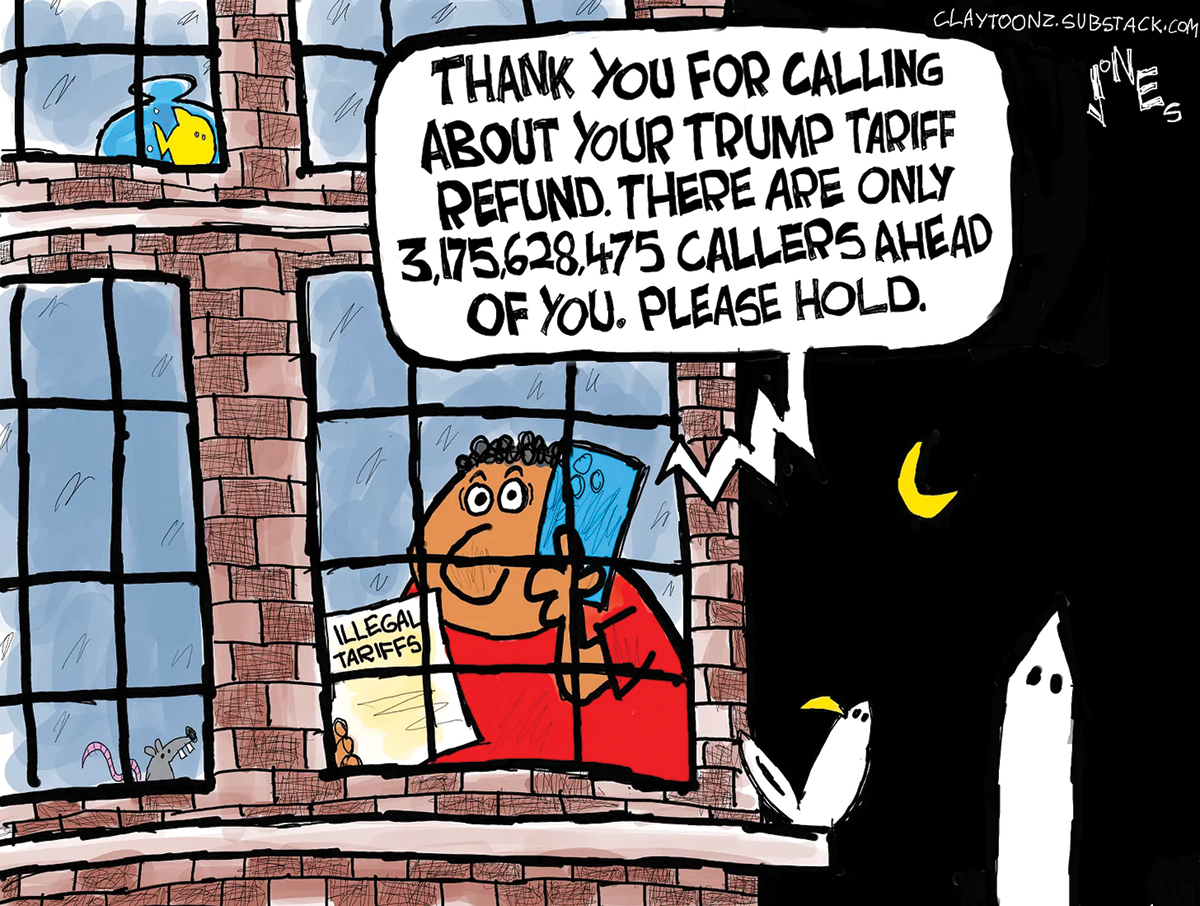 Political cartoons for February 23
Political cartoons for February 23Cartoons Monday’s political cartoons include tariff refunds, Epstein Island visits, and more
-
 Can Keir Starmer save the Chagos deal?
Can Keir Starmer save the Chagos deal?Today's Big Question Opponents confident they can scupper controversial agreement as PM faces a race against time to get it over the line
-
 China and the rise of the humanoid robots
China and the rise of the humanoid robotsThe Explainer The country’s ‘bustling’ robotics industry is dominating the global market, though experts are split on how concerned we should be
-
 Powell: The Fed’s last hope?
Powell: The Fed’s last hope?Feature Federal Reserve Chairman Jerome Powell fights back against President Trump's claims
-
 The end for central bank independence?
The end for central bank independence?The Explainer Trump’s war on the US Federal Reserve comes at a moment of global weakening in central bank authority
-
 Who will be the next Fed chair?
Who will be the next Fed chair?Today's Big Question Kevin Hassett appears to be Trump’s pick
-
 Should Labour break manifesto pledge and raise taxes?
Should Labour break manifesto pledge and raise taxes?Today's Big Question There are ‘powerful’ fiscal arguments for an income tax rise but it could mean ‘game over’ for the government
-
 What are stablecoins, and why is the government so interested in them?
What are stablecoins, and why is the government so interested in them?The Explainer With the government backing calls for the regulation of certain cryptocurrencies, are stablecoins the future?
-
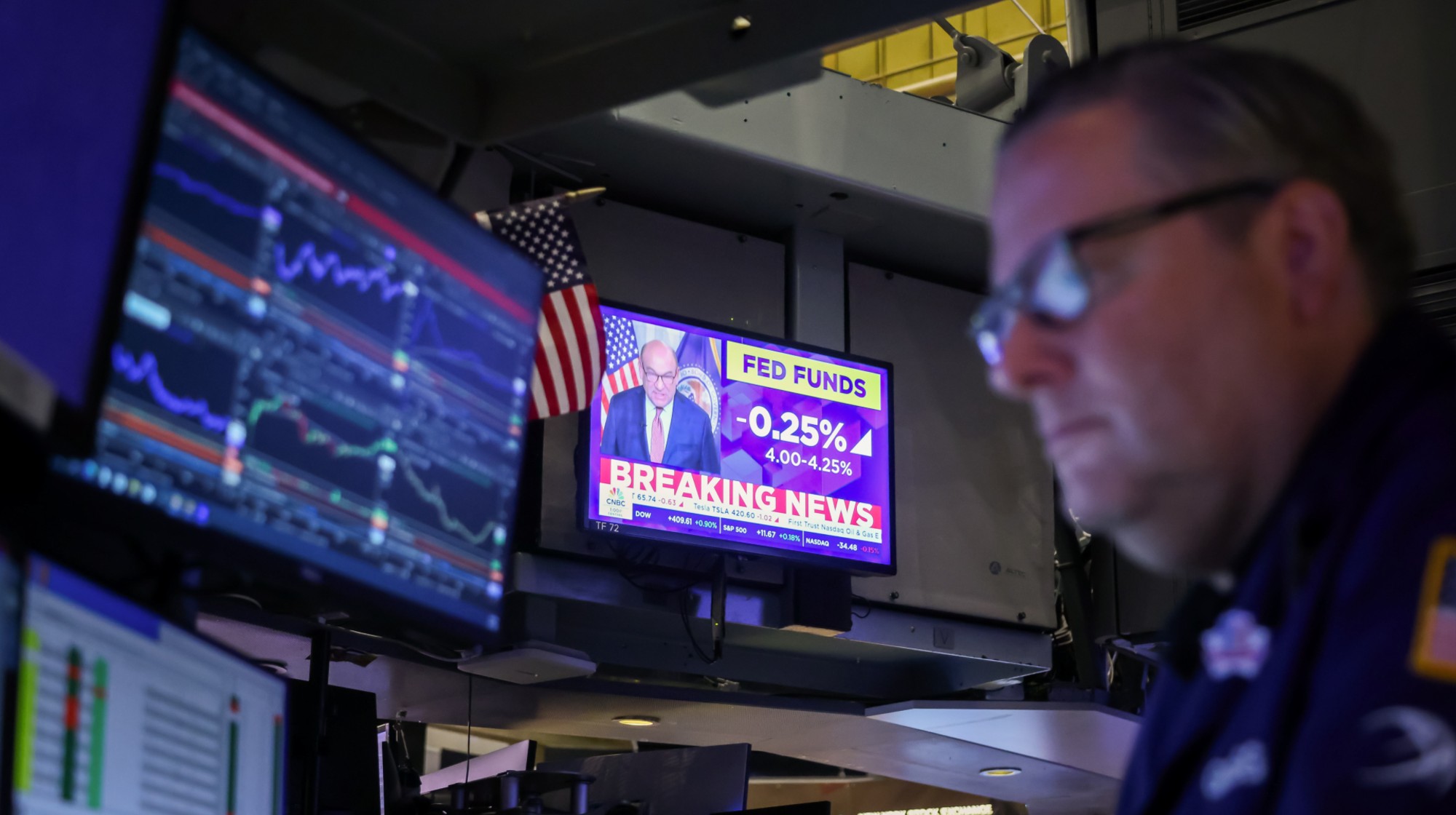 Fed cuts interest rates a quarter point
Fed cuts interest rates a quarter pointSpeed Read ‘The cut suggests a broader shift toward concern about cracks forming in the job market’
-
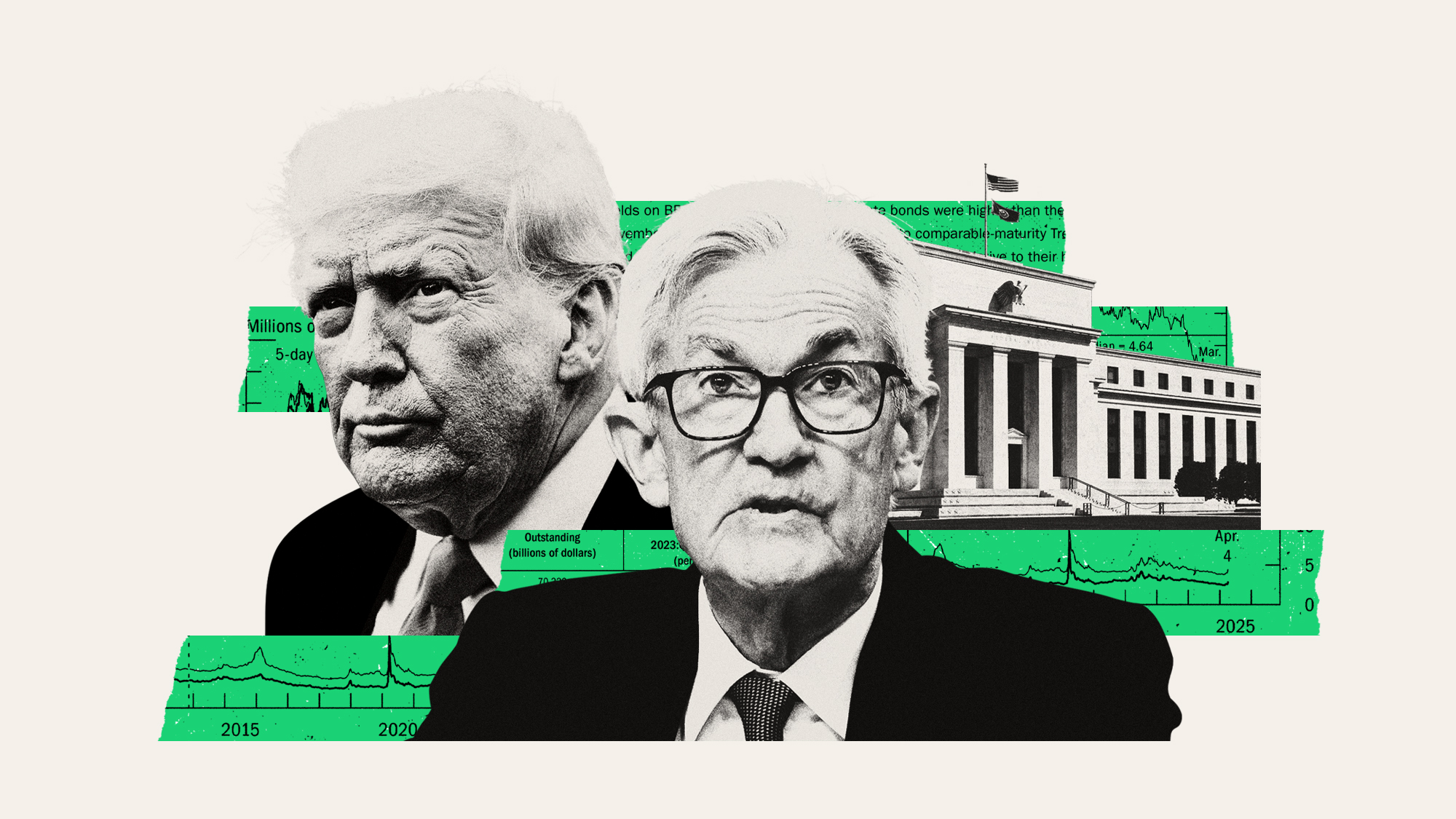 Trump's threats to fire Jerome Powell are unsettling the markets
Trump's threats to fire Jerome Powell are unsettling the marketsTalking Points Expect a 'period of volatility' if he follows through
-
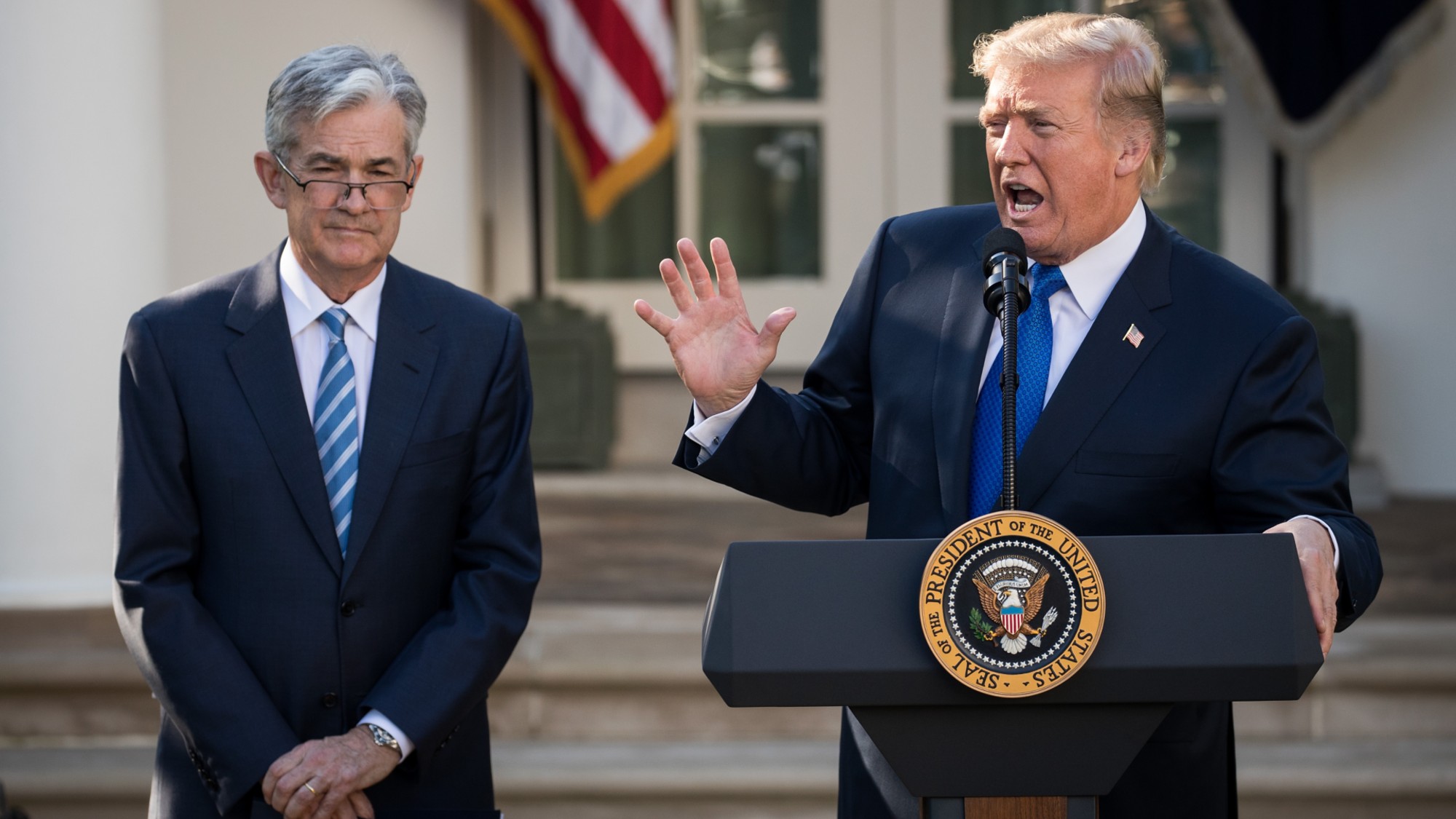 How will Wall Street react to the Trump-Powell showdown?
How will Wall Street react to the Trump-Powell showdown?Today's Big Question 'Market turmoil' seems likely